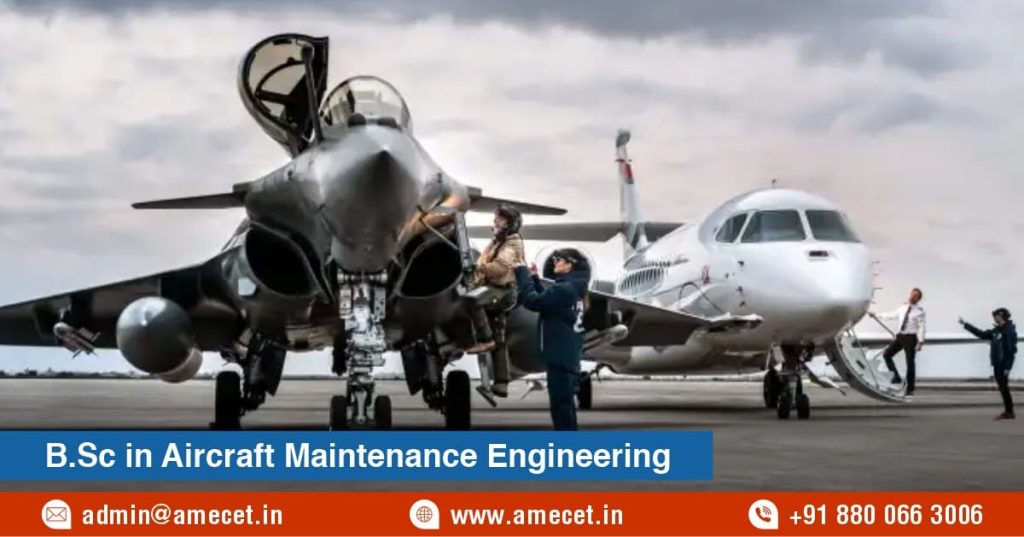How Do You Pursue a B.Sc. in Aircraft Maintenance Engineering?
Posted on : 14 August, 2024 6:07 pm
To pursue a B.Sc. in Aircraft Maintenance Engineering, start by enrolling in a recognized program that offers comprehensive coursework in aviation technology and maintenance practices. Ensure you meet admission requirements, which typically include a high school diploma with relevant science and math courses. The program generally spans three to four years, combining theoretical knowledge with hands-on training. Participate in internships to gain practical experience. Upon completion, you’ll be prepared to enter the aviation industry as a skilled aircraft maintenance engineer.
Page Contents
ToggleAdmission Requirements
To enroll in a B.Sc. in Aircraft Maintenance Engineering, applicants typically need a high school diploma with strong grades in math and science. Standardized test scores (such as SAT or ACT) may be required. Additional requirements often include letters of recommendation, a personal statement, and possibly an entrance exam or interview. Some programs may also consider relevant work experience or extracurricular activities related to aviation.
Points:
- High School Diploma: Essential with a strong academic record.
- Math and Science Grades: High grades in these subjects are crucial.
- Standardized Test Scores: SAT or ACT scores may be needed.
- Letters of Recommendation: Typically from teachers or mentors.
- Personal Statement: An essay explaining your interest and goals.
- Entrance Exam or Interview: Some programs require additional assessments.
- Relevant Work Experience: Advantageous but not always mandatory.
- Extracurricular Activities: Participation in aviation-related activities can strengthen the application.
Choosing the Right Program
Selecting the right B.Sc. in Aircraft Maintenance Engineering program is crucial for a successful career. Consider factors such as the program’s accreditation, faculty qualifications, and facilities. Look for programs with strong industry connections and internship opportunities. Evaluate the curriculum for comprehensive coverage of technical and practical skills. Additionally, check the program’s reputation and graduate outcomes to ensure it aligns with your career goals.
Points:
- Accreditation: Ensure the program is accredited by relevant aviation bodies.
- Faculty Qualifications: Look for experienced and qualified instructors.
- Facilities: Check for up-to-date labs and equipment.
- Industry Connections: Strong ties to the aviation industry enhance opportunities.
- Internship Opportunities: Availability of hands-on training and internships.
- Curriculum: Comprehensive coverage of technical and practical skills.
- Program Reputation: Research reviews and testimonials from current students and alumni.
- Graduate Outcomes: Evaluate the success and employment rates of graduates.
Curriculum Overview
The curriculum for a B.Sc. in Aircraft Maintenance Engineering combines core aviation subjects with essential business and technical skills. Key courses typically include aerodynamics, aircraft systems, maintenance practices, and aviation regulations. The program balances theoretical knowledge with practical training, including hands-on labs and workshops. This well-rounded approach ensures students gain a comprehensive understanding of aircraft maintenance and are prepared for real-world challenges in the aviation industry.
Points:
- Aerodynamics: Study of aircraft flight principles and air dynamics.
- Aircraft Systems: Detailed examination of aircraft components and operations.
- Maintenance Practices: Techniques and procedures for aircraft upkeep.
- Aviation Regulations: Understanding of industry standards and legal requirements.
- Technical Skills: Hands-on training with aviation technology and tools.
- Workshops: Practical sessions for applying theoretical knowledge.
- Safety Protocols: Emphasis on safety and compliance in maintenance.
- Capstone Project: Integrative project or thesis demonstrating overall knowledge.
Duration and Structure
A B.Sc. in Aircraft Maintenance Engineering typically takes three to four years to complete, depending on whether students are enrolled full-time or part-time. The program is structured into semesters or terms, with a blend of core courses, electives, and practical training. Students engage in hands-on labs and internships to gain real-world experience. The program culminates in a capstone project or thesis, integrating learned concepts.
Points:
- Duration: Usually 3 to 4 years for full-time students.
- Semester System: Organized into semesters or terms.
- Core Courses: Includes fundamental subjects in aircraft maintenance.
- Elective Courses: Allows specialization in specific areas.
- Practical Training: Hands-on labs and workshops for real-world experience.
- Internships: Provides industry experience and practical knowledge.
- Capstone Project: Final project demonstrating comprehensive learning.
- Part-Time Options: Available for those balancing work and study.

